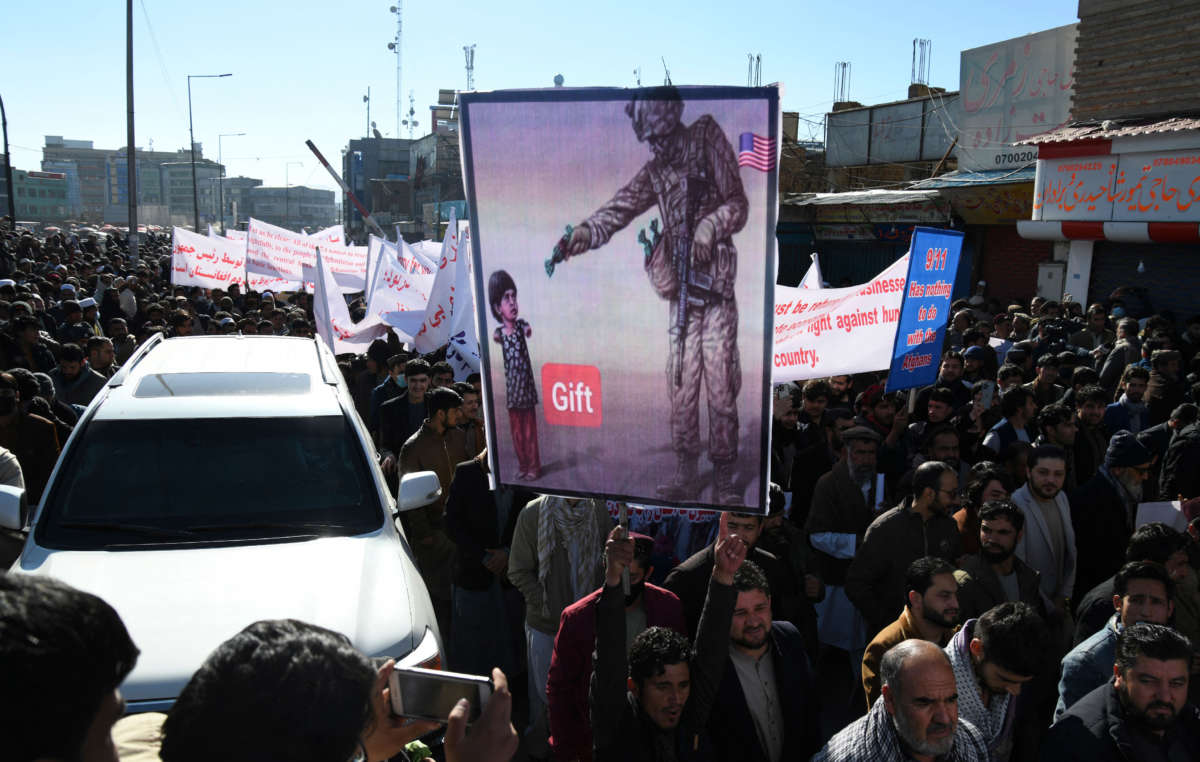
BYAshleigh Subramanian-Montgomery, Truthout
President Joe Biden recently declared a national emergency in the name of addressing the dual threats of the massive humanitarian catastrophe unfolding in Afghanistan, as well as “the potential for a deepening economic collapse in Afghanistan.” He was right to do so.
In sharp contrast, his decision to unilaterally assert the U.S.’s authority to redistribute $7.1 billion of Afghanistan’s frozen funds as it sees fit was dead wrong. In declaring the national emergency, the president laid out his administration’s vision for Afghanistan’s funds should U.S. courts voice their approval: that half be made available, pending litigation, to the families of 9/11 victims who have claims against the Taliban for its role in harboring al-Qaeda. The remaining $3.5 billion would go towards humanitarian efforts.
Setting aside the moral and political problems inherent in the U.S. effectively stealing billions of dollars from a nation ravaged by a U.S.-initiated war and the resulting humanitarian and economic devastation, the president’s failure to make any of these funds immediately available to the people of Afghanistan in their hour of need is unforgivable. In abdicating responsibility to the courts, which may take months to decide how these frozen funds can be redistributed, the Biden administration is threatening the well-being of millions of Afghans, while also undermining the ability of civil society organizations to respond to the crisis. This is in direct opposition to the “beacon of human rights” the U.S. claims to be.
To say that Afghanistan is in urgent need is to understate the severity of the situation. Over 24 million Afghans, nearly 60 percent of the population, need humanitarian aid. Some 23 million face acute food insecurity, meaning their lives are in immediate danger, and over 1 million children are at risk of death due to severe acute malnutrition. While Afghanistan has faced humanitarian challenges for years as a result of conflict, U.S. occupation and natural disasters, the current situation is markedly worse, in no small part due to U.S. policies towards Afghanistan in the wake of the Taliban takeover.
When the Taliban took control of the country last August, the Biden administration froze $7.1 billion in Afghanistan’s foreign reserves held in the U.S. — money that belongs to the Afghan people — and that prior to the takeover, the Central Bank of Afghanistan (Da Afghanistan Bank) had been using to maintain economic stability.
The resulting liquidity crisis has led to massive inflation, alongside depreciation of the Afghani, whose value the Central Bank can no longer stabilize by selling off its foreign reserves. Many banks in Afghanistan have dramatically limited the amount of money account holders can withdraw, while others have closed entirely. Businesses, no longer able to pay their employees, have shuttered, leading to rampant unemployment. The price of food has risen, while the value of the Afghani has plummeted, leading to mass starvation.
As a further result of freezing these funds and of U.S. sanctions that have led risk-averse banks to severely limit access to financial services in Afghanistan, local and international aid groups and other civil society organizations in Afghanistan are struggling to pay their staff and provide services to the millions of Afghans in need.
Kate Phillips-Barrasso, director of humanitarian policy at InterAction, a network of humanitarian aid organizations, recently explained that financial service providers “just don’t want to get involved. There’s a lot of risk aversion. Financial institutions say that even with explicit permission, it still reeks of effort and risk, and it’s better to just not provide the service.” As a result, aid organizations are turning to informal cash transfer networks, which entail greater risk and higher fees. Some have also turned to cryptocurrency as another means of getting funds into the country, despite challenges arising from limited use of cryptocurrency among much of the population. While these workarounds have offered some relief, limited access to cash and financial services is still plaguing the humanitarian aid sector as a direct result of U.S. policy.
The Biden administration must urgently reconsider and correct its policies towards Afghanistan, and towards Afghanistan’s foreign reserves in particular. Shah Mehrabi, a member of the Supreme Council of Afghanistan’s Central Bank and a professor of economics at Montgomery College, has called on the administration to “allow the Central Bank of Afghanistan limited, monitored, and conditional access to $150m per month from Afghanistan’s foreign reserves,” citing the Central Bank’s “independen[ce] from the Afghan government,” and the U.S.’s ability to monitor how the funds are dispersed. Some form of a phased release of the frozen funds has widespread support, including from members of the U.S. Congress, the United Nations, and prominent international aid groups, human rights groups, and women’s human rights and peace groups.
Beyond releasing the frozen funds, the Biden administration must also lift sanctions on Afghanistan, which have done almost nothing to incentivize the Taliban to change its policies. Instead, sanctions have unleashed a chilling effect on national and international banking in Afghanistan by shutting down access to financial services, causing dire repercussions to Afghan lives and preventing civil society groups from addressing the crisis. While the U.S. Treasury Department has issued piecemeal general licenses aimed at enabling civil society organizations to continue their work in Afghanistan, these necessary but insufficient steps have failed to address the financial access issues caused by sanctions, let alone the liquidity crisis caused by freezing Afghanistan’s foreign reserves.
There is room for honest debate about precisely how, not if, these frozen funds should be returned to the people of Afghanistan, and which, if any, sanctions should remain in place — however, there is no room, or time, to cling to a status quo that is starving Afghanistan’s people and its economy.



